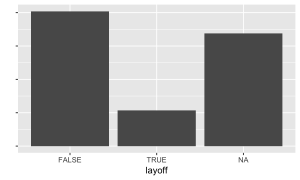Layoff

Being laid off is a sudden and often unexpected experience with potentially detrimental consequences for one’s family.
We want to know: When a caregiver is laid off, do adolescent children suffer collateral damage?
Survey question
When children were about 15 years old, each child’s primary caregiver was asked the following question:

How we cleaned the data
Those who did not participate in the age 15 interview, as well as those who refused (-1) or didn’t know (-2), were coded as NA. Those who have never worked or have not worked since the age 9 interview (in approximately the prior 6 years) were coded as NA; these respondents are not at risk for a layoff. Those who responded “Yes” were coded 1, and those who responded “No” were coded 0.
Distribution in the training set

Scientific motivation
A steady jobs can provide financial security to a family. However, this security can be upset by plant closures, downsizing, and other economic shifts that lead caregivers to lose their jobs. In addition, some caregivers may be fired but report in a survey that they have been laid off. In any case, layoff of a caregiver could create dramatic disadvantages for adolescents nearing the transition to adulthood.
Social scientists worry about layoffs because precarious work is on the rise. In Good Jobs, Bad Jobs, University of North Carolina sociologist Arne L. Kalleberg outlines economic shifts that have made steady employment harder to come by in the United States over the past several decades. Gone are the days when workers could count on a single job to carry them throughout their careers – job changes and unexpected unemployment are now commonplace.
Social scientists also worry about layoffs because they may negatively influence child achievement. Sociologists Jennie E. Brand (UCLA) and Juli Simon Thomas (Harvard) have shown in an article published in the American Journal of Sociology that maternal job displacement reduces a child’s chances of high school and college completion by 3 – 5 percentage points, with even larger effects among those unlikely to experience job displacement and those whose mothers experienced job displacement while the child was an adolescent. When caregivers lose their jobs, children suffer collateral damage.
However, causal conclusions always depend on modeling assumptions. The propensity score matching methods used in the paper cited above assume that the model for the probability of job displacement is correctly specified, and that there are no unmeasured variables that affect job displacement and also directly affect child outcomes. To learn more on these assumptions, see our blog post on causal inference.
The Fragile Families Study follows a particularly disadvantaged sample of urban children, for whom we would especially like to know the effect of maternal layoff on adult outcomes. By participating, you help us to produce a collaborative propensity score model that combines the best of all the individual submissions into a single metric that is robust to the modeling decisions of individual researchers. This model will also help us target interviews at the children best positioned to lend suggestive evidence about the plausibility of the untestable conditional ignorability assumption required for causal inference. If this assumption seems credible after interviews, we will use our collaborative propensity scores to estimate the causal effect of caregiver layoff on child outcomes in early adulthood, once those outcomes are measured several years from now.
By participating, you can be part of an extending our body of knowledge to provide maximally robust causal evidence with observational data about the effect of caregiver layoffs on child outcomes in a disadvantaged urban sample. Results will inform policy changes about whether support for steady caregiver employment could help disadvantaged children.
Be a part of the solution. Apply to participate, build a model, and upload your contribution.

Add your comment